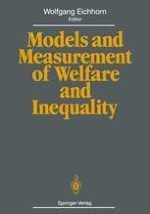1994 | OriginalPaper | Buchkapitel
Measurement of Tax Progressivity with Nonconstant Income Distributions
verfasst von : Christian Seidl
Erschienen in: Models and Measurement of Welfare and Inequality
Verlag: Springer Berlin Heidelberg
Enthalten in: Professional Book Archive
Aktivieren Sie unsere intelligente Suche, um passende Fachinhalte oder Patente zu finden.
Wählen Sie Textabschnitte aus um mit Künstlicher Intelligenz passenden Patente zu finden. powered by
Markieren Sie Textabschnitte, um KI-gestützt weitere passende Inhalte zu finden. powered by
A great variety of measures of tax progressivity has been proposed in the literature. Global measures of tax progressivity associate a single real number with each tax schedule using the income distribution which holds in the respective economy. Though it seems that global measures of tax progressivity might most easily cope with different income distributions associated with different tax schedules, they may classify tax schedules with regressive intervals as progressive or proportional, and tax schedules with progressive intervals as regressive. This provokes the question whether it is valid to devise a single number to encapsulate what must be viewed as a series.This paper, therefore, resumes the analysis of tax schedules with respect to their uniform progressivity vis-á-vis other tax schedules. This examination relies on relative concentration curves or differences of concentration curves of taxes on the one hand and post-tax incomes on the other. It is performed in the income space Y, as well as in the space of the fraction q of the lowest income earners as a share of all income earners and in the fraction p of the compound income of the lowest income earners as a share of total income.Different income distributions for the situations to be compared are admitted throughout the paper. A series of sufficient conditions for dominance of progressivity of tax schedules associated with the income distributions, which hold in the respective economy, are developed, and the relationships both for the different approaches of defining uniformly greater progressivity and for global measures of tax progressivity are shown. These sufficient conditions are essentially composed of an elasticity measure of the tax schedule and the elasticity of the density function of the income distribution in terms of analysis in the Y-space or the density function of the income distribution in terms of analysis in the q-space and in the p-space.Journal of Economic Literature classification numbers: H20, D31, C43.
